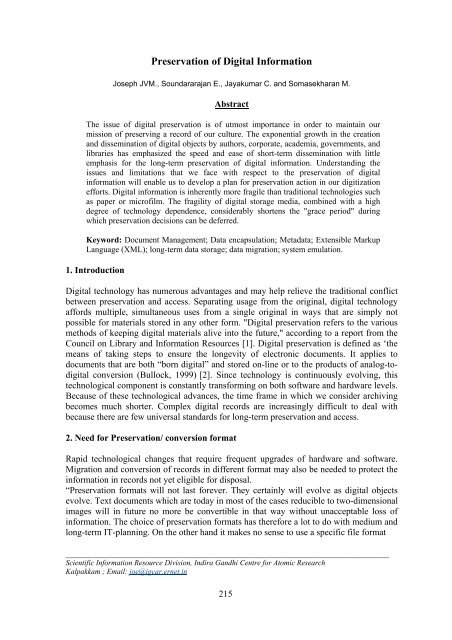7 - Indira Gandhi Centre for Atomic Research
7 - Indira Gandhi Centre for Atomic Research
7 - Indira Gandhi Centre for Atomic Research
Create successful ePaper yourself
Turn your PDF publications into a flip-book with our unique Google optimized e-Paper software.
Preservation of Digital In<strong>for</strong>mation<br />
Joseph JVM., Soundararajan E., Jayakumar C. and Somasekharan M.<br />
Abstract<br />
The issue of digital preservation is of utmost importance in order to maintain our<br />
mission of preserving a record of our culture. The exponential growth in the creation<br />
and dissemination of digital objects by authors, corporate, academia, governments, and<br />
libraries has emphasized the speed and ease of short-term dissemination with little<br />
emphasis <strong>for</strong> the long-term preservation of digital in<strong>for</strong>mation. Understanding the<br />
issues and limitations that we face with respect to the preservation of digital<br />
in<strong>for</strong>mation will enable us to develop a plan <strong>for</strong> preservation action in our digitization<br />
ef<strong>for</strong>ts. Digital in<strong>for</strong>mation is inherently more fragile than traditional technologies such<br />
as paper or microfilm. The fragility of digital storage media, combined with a high<br />
degree of technology dependence, considerably shortens the "grace period" during<br />
which preservation decisions can be deferred.<br />
Keyword: Document Management; Data encapsulation; Metadata; Extensible Markup<br />
Language (XML); long-term data storage; data migration; system emulation.<br />
1. Introduction<br />
Digital technology has numerous advantages and may help relieve the traditional conflict<br />
between preservation and access. Separating usage from the original, digital technology<br />
af<strong>for</strong>ds multiple, simultaneous uses from a single original in ways that are simply not<br />
possible <strong>for</strong> materials stored in any other <strong>for</strong>m. "Digital preservation refers to the various<br />
methods of keeping digital materials alive into the future," according to a report from the<br />
Council on Library and In<strong>for</strong>mation Resources [1]. Digital preservation is defined as ‘the<br />
means of taking steps to ensure the longevity of electronic documents. It applies to<br />
documents that are both “born digital” and stored on-line or to the products of analog-todigital<br />
conversion (Bullock, 1999) [2]. Since technology is continuously evolving, this<br />
technological component is constantly trans<strong>for</strong>ming on both software and hardware levels.<br />
Because of these technological advances, the time frame in which we consider archiving<br />
becomes much shorter. Complex digital records are increasingly difficult to deal with<br />
because there are few universal standards <strong>for</strong> long-term preservation and access.<br />
2. Need <strong>for</strong> Preservation/ conversion <strong>for</strong>mat<br />
Rapid technological changes that require frequent upgrades of hardware and software.<br />
Migration and conversion of records in different <strong>for</strong>mat may also be needed to protect the<br />
in<strong>for</strong>mation in records not yet eligible <strong>for</strong> disposal.<br />
“Preservation <strong>for</strong>mats will not last <strong>for</strong>ever. They certainly will evolve as digital objects<br />
evolve. Text documents which are today in most of the cases reducible to two-dimensional<br />
images will in future no more be convertible in that way without unacceptable loss of<br />
in<strong>for</strong>mation. The choice of preservation <strong>for</strong>mats has there<strong>for</strong>e a lot to do with medium and<br />
long-term IT-planning. On the other hand it makes no sense to use a specific file <strong>for</strong>mat<br />
_______________________________________________________________________<br />
Scientific In<strong>for</strong>mation Resource Division, <strong>Indira</strong> <strong>Gandhi</strong> <strong>Centre</strong> <strong>for</strong> <strong>Atomic</strong> <strong>Research</strong><br />
Kalpakkam ; Email: joe@igcar.ernet.in<br />
215
















